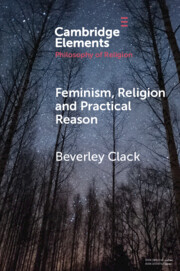Element contents
Feminism, Religion and Practical Reason
Published online by Cambridge University Press: 30 November 2021
Summary
Keywords
- Type
- Element
- Information
- Online ISBN: 9781108859653Publisher: Cambridge University PressPrint publication: 06 January 2022
References
- 7
- Cited by



